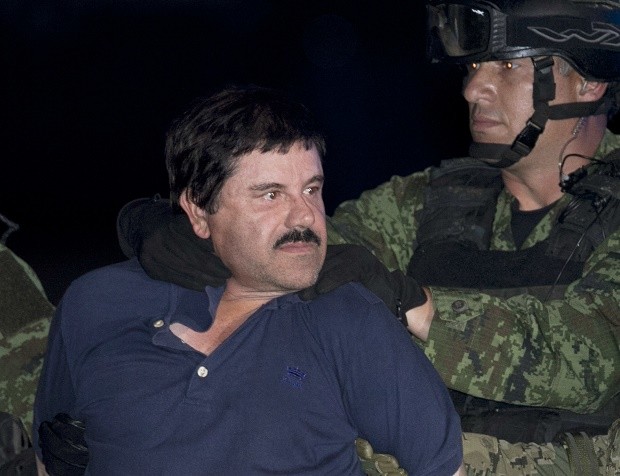
In this Jan. 8, 2016, file photo, Mexican drug lord Joaquin “El Chapo” Guzman is made to face the press as he is escorted to a helicopter in handcuffs by Mexican soldiers and marines at a federal hangar in Mexico City, Mexico. The son of the imprisoned drug lord may be among the half-dozen men abducted by gunmen at a restaurant in the Mexican beach resort of Puerto Vallarta, authorities said Tuesday, Aug 16, 2016. AP FILE PHOTO
A US federal judge ruled Friday that Mexican drug lord Joaquin “El Chapo” Guzman, one of the world’s most notorious criminals, will stand trial on April 16, 2018.
The 60-year-old kingpin, accused of running one of the world’s biggest drug empires, was extradited to New York on January 19 and has been held in solitary confinement in Manhattan ever since.
“The trial date is set for April 16. Let’s try to make this date,” Judge Brian Cogan told a pre-trial hearing in a Brooklyn federal court room, attended by Guzman, dressed in navy prison scrubs.
Guzman sat between his lawyers with a serious expression on his face, responding “yes sir” when addressing the judge through an interpreter, and exchanging glances with his former beauty queen wife Emma Coronel.
The 27-year-old mother of his twin daughters sat in the gallery, dressed head to toe in white.
US prosecutors expect the trial to last two to three months.
Defense lawyer Michelle Gelernt, who has repeatedly challenged the severe conditions of her client’s custody, asked the judge for permission to interact with Guzman in person rather than through a transparent plexiglass wall.
She said the defense needed to show him more than 10,000 documents in order to prepare for trial, which would be difficult to hold up against the glass.
Cogan indicated he was receptive to the request, but deferred making a ruling until after another judge can visit the Metropolitan Correctional Center in Manhattan to assess the conditions in person.
He set the next pre-trial hearing for August 15.
On Thursday Cogan relaxed slightly just a few of the stringent conditions in which Guzman is held in custody, allowing him to exchange, pre-screened written messages with his wife but denying him family visits and phone calls.
He denied a request for Amnesty International to visit and refused to allow Guzman to move out of solitary confinement. The defendant twice escaped prison in Mexico, once while under 24-hour surveillance in solitary confinement.
Guzman pleads not guilty to firearms, drug trafficking and conspiracy charges. If convicted, he is likely to spend the rest of his life in a maximum security US prison.